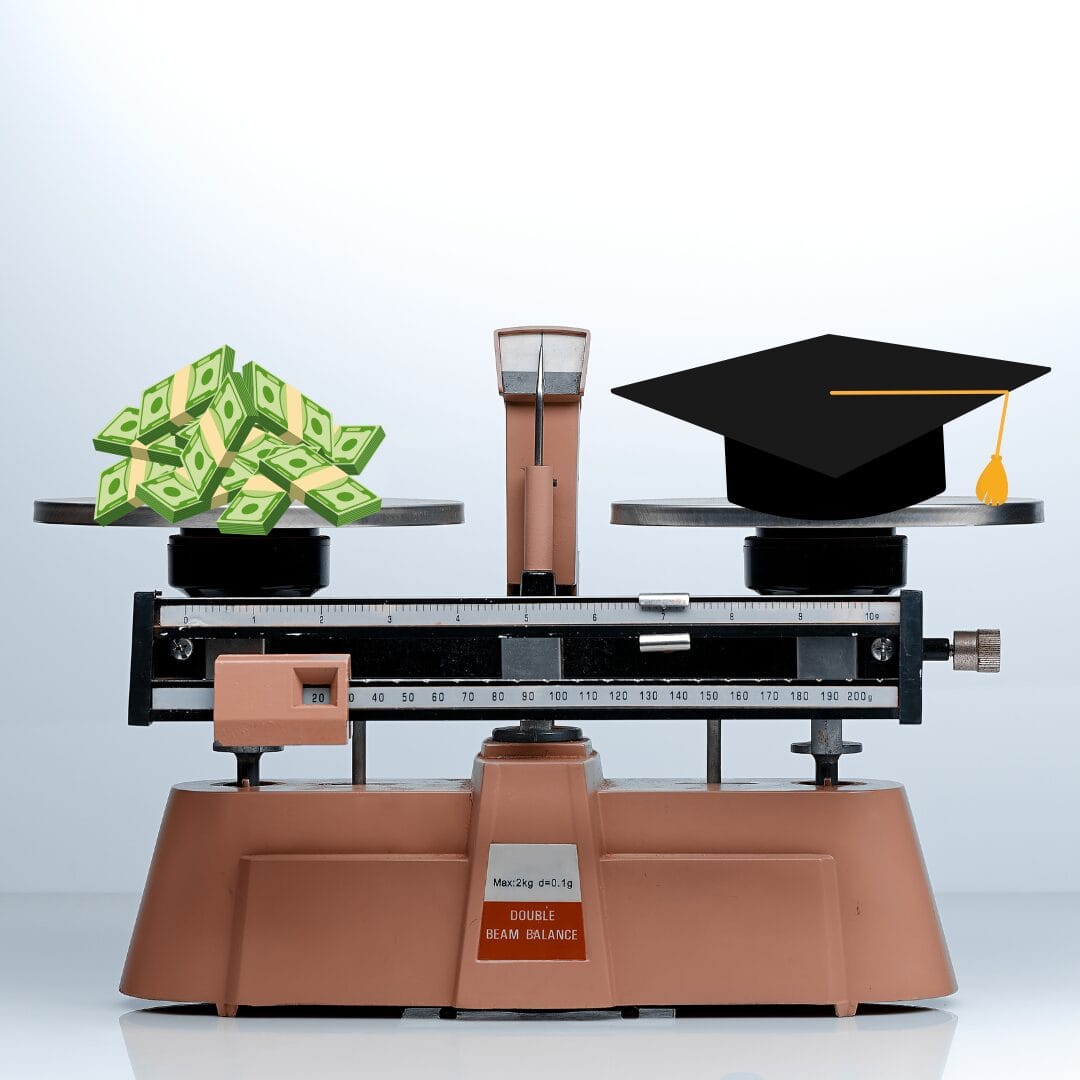
Disclaimer: The information provided in this article is meant for informational purposes only and should not be considered financial advice. You should consult a professional financial advisor who can advise you based on your unique financial situation.
Are you feeling overwhelmed by your student loan debt? You’re not alone. About one in six American adults (nearly 43 million people) have federal student loan debt, and total student loan debt across the United States has grown to $1.777 trillion. In a country where the average balance of federal and private student loans could be as high as $41,618 per borrower, it’s crucial to have a solid plan for tackling this debt. We’re exploring four powerful tips on how to pay off student loans fast and answering common student loan questions to help you take control of your finances. Ready to move towards a debt-free life? Let’s dive in!
1. Pay More than the Minimum When Possible
Like a car loan or a mortgage, you’re typically responsible for a monthly payment to your student loan servicer, starting six months after you graduate for federal loans. There are many different types of student loan repayment plans and how much you owe monthly depends heavily on which one you’re enrolled in. Private student loans each have their own repayment plans, but for most federal student loans (92.2% of all student loan debt), these repayment plans are:
- Standard: Fixed payments that ensure your loans are repaid after 10 years.
- Graduated: Lower payments that increase over time usually every two years that ensure your loans are repaid after 10 years.
- Extended: Fixed or graduated student loan repayment plans that ensure you repay your debt within 25 years.
- IBR Plan: 10% or 15% of your discretionary income but never more than what you’d pay under a standard repayment plan.
- ICR Plan: 20% of your discretionary income or the amount you’d pay with a fixed payment over 12 years, whichever is less.
- SAVE Plan: 10% of your discretionary income.
As a borrower, you’re responsible for paying the minimum on your monthly statement, but you can always pay more if your situation allows—regardless of the repayment plan you’re on. If you find yourself with extra income one month, consider using some of that toward your student loans. Your debt accrues interest, and if you can lower the principal by paying more when you can, you’ll knock out your loans faster and end up paying less in the long run.
2. Refinance Your Student Loans
When you are given a student loan, the lender gives you that money with a fixed interest rate, which means the interest rate remains constant throughout the life of the loan, regardless of changes in the market. As you start to repay these loans, you might find this interest rate untenable to your current financial situation, at which point you could refinance your student loans to lower your interest rate. Having a lower interest rate could make it quicker for you to repay your total debt liability.
But be careful: if you have federal student loans, you’ll have to refinance into a private loan. This means you’ll lose certain rights and benefits that private lenders are not required to provide, such as:
- Loan payment relief (like deferment or forbearance).
- No interest on subsidized loans when payments are deferred.
- Loan forgiveness.
Refinancing your student loans is a big decision that necessitates deep thought before going through with it. Make sure you weigh all of your options carefully and consult a professional financial advisor before deciding.
3. Use the Debt Avalanche Method
We get it—student loans are probably not the only debt you have. Credit cards and other interest accruing debt can make it exceptionally difficult to determine what’s important to prioritize first. One easy way to tackle this is by leveraging the “debt avalanche method,” otherwise known as paying off your highest interest debt first. This allows you to limit the amount of interest you accumulate, which lowers the total amount you owe over time and could accelerate the timeline for paying off your debt.
This method isn’t for everyone, though—unlike the “debt snowball method,” which is when you pay your smallest debts first regardless of interest—the debt avalanche path doesn’t give you small, immediate wins that could help motivate you to continue. It all depends on what type of person you are, and how badly you want to eliminate your debt.
4. Apply Windfalls to Your Loans
Did you just get a big tax return? Grandma and grandpa give you some extra cash for your birthday? Instead of spending that on a new video game system or a vacation, consider applying this extra money to your student loans.
When you do this consistently, you’ll slowly but surely reduce the amount of money you owe to your lender. Not to mention, you’ll build a stronger mindset for attacking your debt and improving your overall financial health. By prioritizing debt repayment over short-term indulgences, you’re investing in your future financial freedom. This habit can significantly accelerate your journey to becoming debt-free, potentially saving you thousands in interest and freeing up your future income for other financial goals.
Student Loans: Frequently Asked Questions (FAQs)
Now that you have some tips on how to pay off student loans fast, you might still have some questions about student loans in general. Here are some FAQs about student loans:
Subsidized Loan vs Unsubsidized Loan: What’s the difference?
The U.S. Department of Education (DOE) offers two main versions of federal student loans: direct subsidized loans and direct unsubsidized loans. Here’s the difference between both:
- Direct Subsidized Loans
- Available to undergraduates who demonstrate financial need.
- Schools determine borrowed amounts.
- The DOE pays interest while you’re in school, for the first six months after school, and during a period of deferment.
- Direct Unsubsidized Loans
- Available to undergraduate and graduate students with no requirement to demonstrate financial need.
- Schools determine borrowed amounts.
- You’re responsible for paying interest.
Should I pay off my student loans?
Yes, you should definitely pay off your student loans. If you fail to pay your student loans, the loans may eventually go into default. This could seriously damage your credit score, reducing your ability to borrow in the future. If you don’t pay your loans, the government will try to recoup its money by garnishing your wages, tax returns, and more.
Moreover, the longer you carry the debt, the more interest you’ll pay over time. By paying off your loans, you’ll free up your monthly budget, reduce financial stress, and open up opportunities for other financial goals like saving for a home, investing for retirement, or starting a business.
Can you pay student loans with a credit card?
You can’t pay off federal student loans with a credit card, but you may be able to pay off private student loans with a credit card, but this depends heavily on the lender. However, even if you can use your credit card to pay off student loans doesn’t mean you should. Using your credit card to pay off student loans could result in:
- Higher interest rates.
- Lower credit scores due to higher credit utilization.
- Additional fees from the credit card company and the loan servicer.
- Loss of student loan protections and benefits.
In most cases, using a credit card to pay off student loans isn’t a financially sound decision. It’s generally better to explore other options like income-driven repayment plans, refinancing, or seeking additional income sources to manage your student loan debt.
How can you reduce your total loan cost?
There are a few methods for reducing your total loan cost:
- Pay more than the minimum amount.
- Make bi-weekly payments instead of monthly.
- Refinance to a lower interest rate if possible.
- Apply any windfalls or extra income to your loan principal.
- Consider income-driven repayment plans for federal loans.
- Take advantage of interest rate reductions for automatic payments.
By implementing one or more of these strategies, you can potentially save thousands of dollars in interest over the life of your loan. Remember, even small additional payments can make a significant difference in the long run. The key is to be consistent and strategic in your approach to loan repayment.
What happens if you don’t pay student loans?
If you don’t pay your student loans, they will eventually go into default. This can have disastrous consequences on your short- and long-term financial health as it could lead to:
- Severe damage to your credit score, making it difficult to obtain loans, credit cards, or even rent an apartment.
- Wage garnishment, where a portion of your paycheck is automatically deducted to repay the loan.
- Loss of eligibility for additional federal student aid.
- Potential legal action from your lender.
- Ineligibility for loan forgiveness programs.
- Withholding of federal and state tax refunds.
- Added collection fees and increased loan balance due to accrued interest.
Instead of defaulting, it’s crucial to communicate with your loan servicer if you’re struggling with payments.
Can student loans be discharged in bankruptcy?
No, student loans typically cannot be discharged in bankruptcy. In fact, it’s one of the very few categories of debt that cannot be wiped away by declaring bankruptcy. However, there are a few rare exceptions:
- If you can prove “undue hardship” through a separate legal process called an adversary proceeding.
- If the loans are from a private lender and not federally backed.
- In cases of total and permanent disability.
It’s important to note that proving undue hardship is extremely difficult and rarely successful.
Are student loans paused?
No, payments on student loans restarted in October 2023 and the 0% interest rate ended in September 2023, according to StudentAid.gov. Student loan payments were paused for a time due to the COVID-19 pandemic, but that’s since changed.
What is forbearance on a student loan?
Student loan forbearance is a temporary period during which your loan servicer allows you to pause or reduce your monthly payments on your student loan debt. While in forbearance, you’re not obligated to make full payments, but interest typically continues to accrue on your loans. This means your overall loan balance may increase during the forbearance period.
Is the student loan grace period ending?
The Department of Education began collecting on defaulted student loans on May 5, 2025. Payments on student loans also restarted in October 2023. These events marked the end of the extended student loan payment pause that was implemented during the COVID-19 pandemic. With the grace period ending, borrowers should:
- Review their current loan status and balance.
- Update contact information with their loan servicer.
- Explore repayment options, including income-driven plans if needed.
- Set up automatic payments to avoid missing due dates.
- Consider budgeting strategies to accommodate the resumed payments.
Ready to Take Control of Your Financial Future? Join Our Team!
At Barton Associates, we understand the challenges of managing student loan debt while building a rewarding career. As a national leader in locum tenens staffing, we offer competitive compensation that can help you accelerate your loan repayment.
Interested in learning more? Check out our open positions and apply today!


